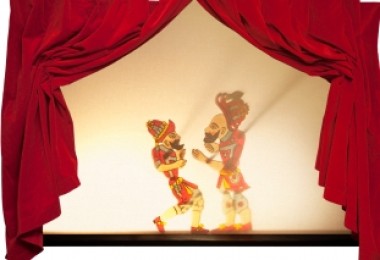Translation Romani has decided to maintain use of the word Romani in all language versions of this website, inclusively and in reference both to the language and people of all the diverse ethnic communities throughout the world, i.e. Roma, Sinti, Manuš, Calé, Romanichal, Kalé, and many others. Please read the important notes from our translators for explanations and other translations currently in use locally, nationally or regionally.
Close this box.
Theatrical works have long been studied in the West as "drama" within the context of literature, where emphasis has been focused primarily on the written text, for example, on reading ancient Greek, Roman, and classical European plays. During the 1990s, academic scholarship began to explore and address the theatre histories of diverse cultures and peoples around the globe. They also began to concentrate more systematically on the necessary aspects of performance, with roots in oral culture and traditions. Early oral epic texts, such as Gilgamesh (Sumeria), Mahabharata and Ramayana (India), and the Iliad and the Odyssey (Greece), which had been regularly recited and performed by storytellers and poets, were analyzed for the elements and devices of orality and dramatic recitation that eventually would transfer into some of the earliest expressions of theatre. Throughout history, diverse needs have sparked the materialization of theatrical expression worldwide. In some cases, it has been based profoundly on rituals and religious ceremonies (shamanistic, mystery, and passion plays). It has also been cultivated and supported as an expression of high culture in imperial courts, states and nations (Jīngjù in China, Noh in Japan, 17th c. classical era in France ). It has emerged consistently in the form of popular, street theatre and carnival, often tapping into more ancient performance traditions such as puppetry, shadow plays (Ottoman Turkish Karagöz), and the improvisational Italian commedia dell`arte. The modern era ushered in not only musicals and vaudeville but also different forms of politicized theatre: subversive theatre (anti-colonialist); protest theatre (anti-Apartheid in South Africa); and social action and activist theatre (the Theatre of the Oppressed in Brazil). Many contemporary theatre initiatives seek expression that is more community-based, interactive, cross-cultural, and educational, as the hybrid performances and theatre created to raise awareness of health issues (HIV/AIDS) and social problems (racism and discrimination) all testify.
While the beginnings of a modern Romani theatre manifest some of the same tendencies as theatre traditions elsewhere, there are unique specificities that characterize it as well, namely the lack of a single territory or nation-state unifying all Romani language and culture globally. As such, it converges with the multiple histories, linguistic and cultural traditions in the countries where Romani live locally. Historically, given the fact that Romani groups had settled in Anatolia (which passed from Byzantine to Ottoman during the 13th-15th c.), it is not surprising to find some references to Romani diffusion of Karagöz shadow plays and puppets. The first professional Romani theatre troupe did not emerge until 1931. Performing mainly in Russian with some Romani passages and music interspersed, the Moscow-based Teatr Romen acquired fame, despite the assimilationist policies current at the time in the Soviet Union which favored some folklorization of Romani aesthetic expression. The second, and arguably the most well-known, professional Romani theatre troupe to emerge was the Roma Theatre Phralipe, founded in 1970 by Rahim Burhan in Skopje, Macedonia. With the dissolution of Yugoslavia, the theatre moved to Mülheim, Germany, where it performed at the Theater an der Ruhr from 1991-2001, before transferring to Köln in 2003. They have mostly performed international classics translated into Romani. The third most well-known professional Romani theatre is Romathan, founded in Košice, Slovakia in 1994. It has performed internationally known plays in translation but also original works, both in Romani and in Slovak. In 1999, Rhizomfilm produced a documentary on the troupe. Many initiatives and productions by diverse, smaller groups have appeared during the early 21st c. In 2010, the Romani theatre festival held in Pecs, Hungary (European Capital of Culture) and organized by the Romano Centro Rácz Aladár Közösségi Ház, presented a week-long program of Romani theatre for adults and children. Outside of Europe, Troupe Caravane has been performing in Canada since 1980. Also worthy of note is Romani circus performance, for example the Cirque Romanès in France under the direction of Alexandre Romanès. Finally, Romani writers of other genres have also written plays. Among them are: Rajko Đurić (Serbia), Marcel Hognon (France), José Heredia Maya (Spain), Santino Spinelli (Italy), Jovan Nikolić (Serbia) & Ruždija Russo Sejdović (Montenegro), Ali Krasnići (Albania) and Kujtim Paćaku (Kosovo).
References:
Bakker, Peter and Kyuchukov, Hristo (eds), What is the Romani language? (Paris / Hertfordshire: Centre de recherches tsiganes / University of Hertfordshire Press, 2000).
Courthiade, Marcel. "Le Théâtre Rromani dans le contexte Balkanique." Bulletin de l`Association des Anciens Élèves de l`INALCO (Paris: INALCO, Oct 2001).
Courthiade, Marcel. "Le Théâtre d`expression Rromani." Les Cahiers Maison Antoine Vitez Centre International de la Traduction Théâtrale (Montpellier: CLIMATS, 2001).
Lemon, Alaina (2000), Between Two Fires. Gypsy Performance and Romani Memory from Pushkin to Postsocialism, Durham / London: Duke University Press.
Madison, D. Soyini and Judith Hamera (eds), The SAGE Handbook of Performance Studies (Thousand Oaks: SAGE Publications, 2006).
Rawlings, Keith. "Deeper Investigations into Shadow Theatre and Puppetry." Updated online March 2011.
Rubin, Don (ed), The World Encyclopedia of Contemporary Theatre series (London / New York: Routledge, 1998).
Slichenko, Nikolai. "From Campfire to Footlights: Gypsies in the Theatre." The Patrin Web Journal online.
Williams, Gary Jay (ed), Theatre Histories: An Introduction (New York / London: Routledge, 2006).

Lashi diminyatsa (Kalderash)
Lačhi teharin (Gurbeti)
Lashi detehara! (Lovari)
Latcho/Sukar sabaj (Xoraxane)


